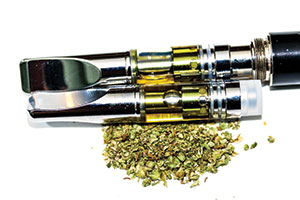Going green for the good of the planet seems like a given in the ganja industry, which historically has touted itself as an advocate of overall health and wellness. But new regulations that rode in last year on the back of legalization are now actually hindering their efforts to do good by Mother Earth.
One of the most problematic emerging issues is what to do about properly disposing or recycling common vape pen batteries and cannabis oil cartridges. The popularity of vaping has increased over the past several years for a number of reasons; for one, the nearly nonexistent odor smells very little like regular pot smoke, making pens a favored choice for discretely puffing in public. They also contain high levels of THCsome well over 90 percentwhich makes them a favored choice for those looking for a one-hitter-quitter. Other advantages cited less frequently include not dealing with lighters or matches (which makes it easy to get a good hit at a windy place like the beach).
Some national surveys report that between 9.9 to 39 percent of adults have used cannabis vape pens, and BDS Analytics, which specializes in cannabis industry data, found that concentrates make up 71 percent of the market’s overall sales in California. However, the growing use of vape pens has also created piles of pens and cartridges in landfills, where the offending items usually end up because their various parts, even those made from recycled materials, aren’t eligible for regular curbside waste collection.
Vape pens and cartridges fall under an unusual category of recycling materialslike light bulbswhich must be disposed of at a hazardous waste facility. The only problem is that the state Bureau of Cannabis Control doesn’t allow them to be disposed of at just any old facility. Even though empty cartridges always have a negligible bit of oil that can’t be used, the state still counts that as marijuana waste and dictates that a company specializing in marijuana waste management must handle it, such as “a regular organic waste collection route used by the local agency, a waste hauler franchised or contracted by the local agency, or a private waste hauler permitted by the local agency.”
One of the most prolific producers of cartridges in the state, Bloom Farms, which stocks its merchandise at San Jose dispensaries Lux and Natural Herbal Pain Relief, used to collect discarded cartridges in drop-off boxes at some dispensaries but no longer does since the state clamped down last year. Other California product manufacturers like OMG Farms had also developed their own recycling program prior to January 2018, and would even refurbish old pens. The program included incentives like giving dispensaries discounts on their next order based on how many devices were previously collected, OMG Farms brand or otherwise.
But the toughest challenge might be what to do about electronic waste from the lithium-ion batteries that are used and, ultimately, unrecyclable. OMG Farms hasn’t been able to recycle their products in more than a year and still sells disposable vape pens that also wind up in the garbage, but the company also continues lobbying regulators to re-legalize their recycling program for the benefit of customers, dispensaries and, most importantly, the environment.




